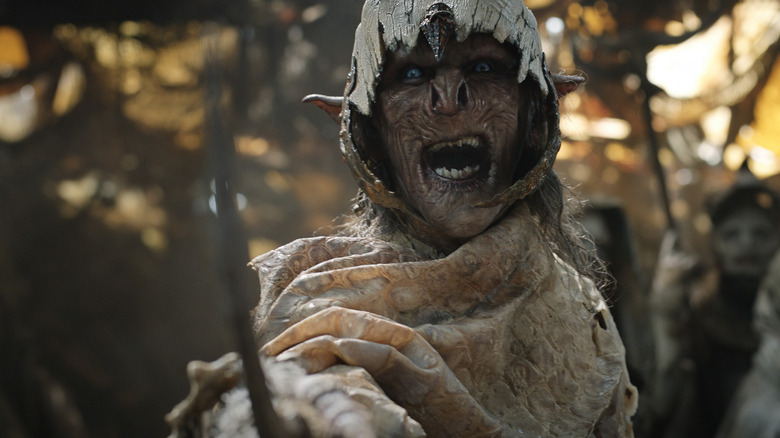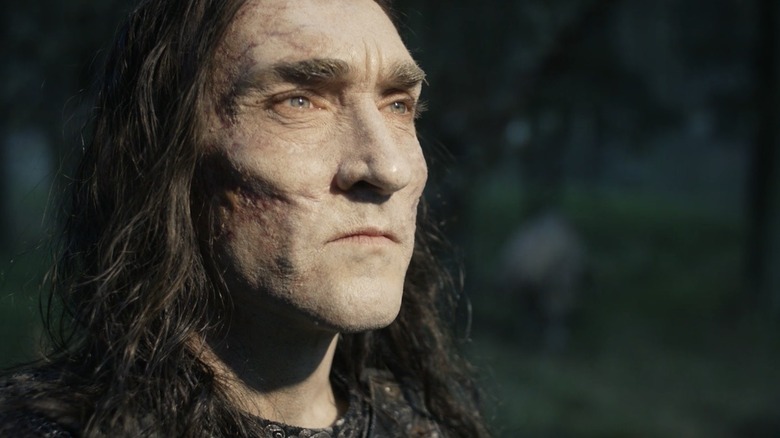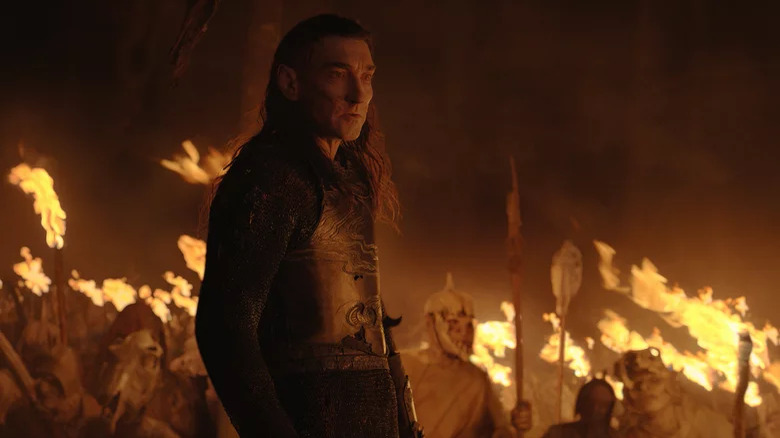Is The Rings Of Power Making Orcs A Sympathetic Race?
"The Lord of the Rings" gave us epic battles, complex stories full of lore and mythos, and great and memorable characters. One thing the movies and books were not, however, was morally ambiguous. In the world of Arda and Middle-earth, there is good and evil, no in-between. Men, elves, and dwarves are good (though they can be corrupted), while orcs and beasts are evil (and cannot be redeemed by good acts).
This is one place where Tolkien's goal for his legendarium to serve as a mythology for Britain full of folk tales and grand stories in the vein of the sagas, rather than a deep and complex story for modern times, is fully present. After all, Tolkien was a white Englishman born in South Africa at the end of the Victorian era; complexity in villains was not exactly the word of the day. Otherwise, it would be hard to believe that the man who served in WWI and saw the pointless horrors of that war would think of good and evil and clear and distinct things.
"The Rings of Power," however, is trying to correct this. The show is in constant conversation with both the Peter Jackson trilogy and Tolkien's work, expanding, interrogating, and at times even contradicting the legendarium. The result is a work that both honors its source material while updating it to the post "Game of Thrones," prestige TV era. Not only does the latest episode give us a rather dark moment for Galadriel, but it seems to suggests orcs are a race worth feeling sympathy for.
'Just as worthy of a home'
Sure, we've had evil but pitiful and sympathetic creatures in the legendarium before. Take Gollum, a despicable character who ends up saving the world by accident, all thanks to Frodo and Bilbo having sympathy for him. But that doesn't apply for the orcs. The orcs have long been a caricature, a species meant only to provide cannon fodder the audience and readers don't feel bad about seeing being mowed down, like stormtroopers in "Star Wars" or Nazis in, well, every movie.
Episode 6 shows Adar give a speech to his people before the big battle, calling them his children. For the first time we see not an army of orcs bred for battle, but a community of soldiers and civilians, men, women and children preparing to fight to get what they have always wished for — a home. As Adar explains later in the episode, they are not just bloodthirsty ghouls (though they are that too), but a race like any other, one that was unfortunately created by a creature of evil, and forced to become slaves to first Morgoth, then Sauron.
"Each one has a name, a heart," Adar tells Galadriel when she calls them a mockery of elves. The way Adar sees it, orcs, or uruk as he prefers to be called, are creations of Eru Ilúvatar, the supreme god of Ards, much in the same way elves are. They are both worthy of life and a home. This is the first time we see the orcs not as conquerors with a scorched earth policy, but a fellowship rooted in a desire for equality.
Orcs are people too?
This gets to the heart of what may be Tolkien's greatest challenge, and possibly his biggest regret, not being able to fully explain and grapple with the origin of orcs. In his later years, Tolkien started revisioning his legendarium, and he began to re-write the origin of the orcs over and over, seemingly after realizing the contradiction of the orcs being both a faceless army that can be slaughtered in a heroic way, while still showing free will and individuality. After all, we see orcs joke around, complain about their bosses, have ranks, and personalities much in the same way the clones do in "Clone Wars." If each orc has a personality, then don't they have a soul? And if they do, are they inherently evil?
This has been a question that no one has been able to easily explain, not Tolkien, not his son who compiled all his work, not the larger fantasy community. In recent years there has been a movement to grapple with the concept of race determining your morals, particularly in the tabletop community, with "Dungeons and Dragons" in particular struggling with this for decades. Orcs, after all, are designated as evil in that game, and no matter what your character does, they will always remain evil. But just as that game is making strides to correct that mistake and eliminate racial stereotypes, so does "Rings of Power" seem to be at least trying to make us at think there is more to the orcs than we imagine. This is a surprising development that shows the writers are willing to even interrogate the source material and call out where it is lacking.


